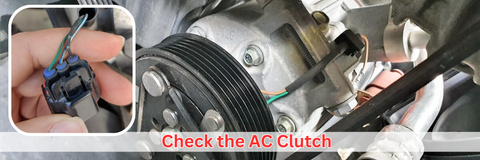How to diagnose car ac compressor failure?
Posted by Hunt Parts on
The summer heat in Canada may be punishing, necessitating the use of a well operating automotive air conditioning system. When the air conditioner in your car starts blowing warm air or makes unusual noises, it's a clue that something is wrong with the compressor. Early detection of AC compressor failure might save you money on repairs and keep you cool during those hot summer days. We'll walk you through the stages to diagnosing AC compressor problems in this blog post.
Step 1: Listen for Unusual Noises

Strange noises are one of the earliest indicators of AC compressor failure. When you switch on the air conditioner, you may hear clunking, grinding, or screeching sounds. These noises suggest that the compressor's internal components are broken or worn out. If you hear any weird sounds, it's time to look into it more.
Step 2: Check for Weak Airflow

If the airflow from your car's vents is insufficient, it could be a sign of an AC compressor failure. The compressor is responsible for pressurizing and circulating the refrigerant, which cools the air before it enters the cabin of your vehicle. A failed compressor may be unable to sustain the required pressure, resulting in decreased airflow and less effective cooling.
Step 3: Evaluate Temperature Discrepancies

Another method for diagnosing AC compressor problems is to compare the temperature of the air coming from the vents while the AC is turned on. Even on the coldest setting, if the air is noticeably warmer than it should be, it indicates that the compressor is not working properly. This temperature difference shows that the compressor's capacity to cool the refrigerant is impaired.
Step 4: Look for Leaks

Leaks of refrigerant can place a burden on your AC compressor and eventually cause it to fail. Inspect the AC system for any obvious traces of refrigerant, such as oily residue around fittings, hoses, or the compressor itself, to look for leaks. Any leaks should be rectified as soon as possible to prevent further damage to the compressor.
Step 5: Check the AC Clutch

The AC compressor usually has a clutch that engages and disengages the compressor as needed. If the clutch fails to engage when you switch on the air conditioner, it could be an indication of an electrical problem or a faulty clutch. This can result in diminished cooling performance or no cooling at all.
Step 6: Consult a Professional

While these procedures can assist you in diagnosing probable AC compressor faults, keep in mind that AC systems can be complex, and do-it-yourself repairs are not always sufficient. If you suspect AC compressor failure or are unclear about the diagnosis, see a professional mechanic or visit an auto parts retailer such as Hunt Parts in Canada for experienced guidance and excellent replacement components.
Conclusion
A faulty air conditioner compressor might make your summer drives unpleasant. You can diagnose AC compressor problems early and take the necessary actions to solve them by paying attention to indications such as strange noises, poor airflow, temperature disparities, and leaks. Remember that regular maintenance and prompt repairs can help keep your car's air conditioning system in good working order, allowing you to stay cool as the temperatures rise. Visit Hunt Parts, Canada's renowned auto parts store, for high-quality auto parts and experienced guidance.
Share this post
0 comment

